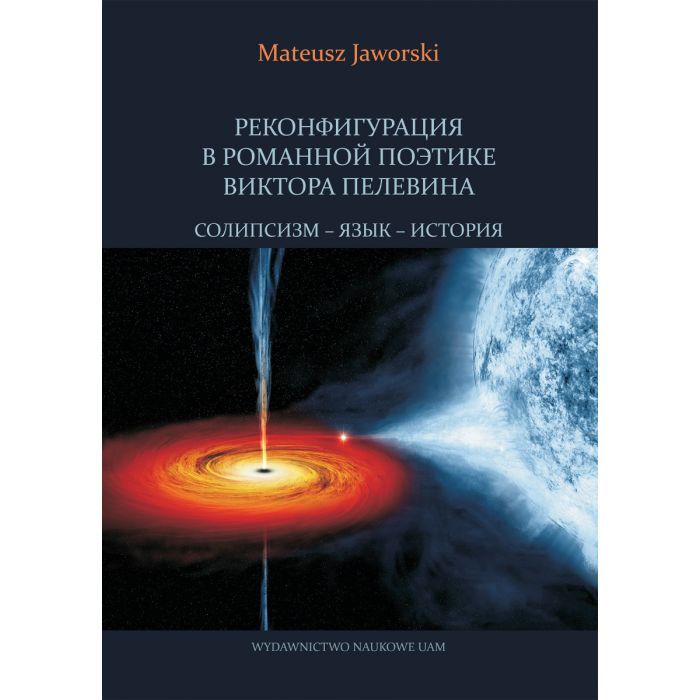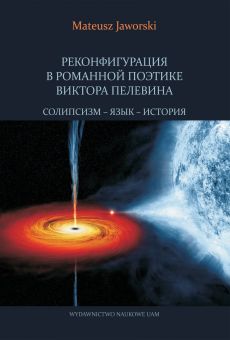Реконфигурация в романной поэтике Виктора Пелевина. Солипсизм – язык – история
- In Stock: in stock
- ISBN: 978-83-232-3594-1
- Category: OUTLET, Russian Philology, Literary Studies
- Year of publication: 2019
Целью наших размышлений была проверка гипотезы о реконфигурационном характере романной поэтики Виктора Пелевина. Необходимо подчеркнуть, что наши рассуждения не претендуют на статус единственной мыслимой интерпретации (sic!), являясь лишь возможным прочтением выбранных текстов русского писателя. В ходе анализа оказалось, что интересующие нас произведения при контекстуальном рассмотрении открываются на целое обилие смысловых космосов. Обнаружение этого семантического потенциала безусловно подтверждает легитимность данного угла прочтения. Кроме того, подробное изучение романов Пелевина привело нас к нескольким далеко не маловажным выводам.
Процедуру реконфигурации безусловно можем считать основой творческого метода автора Чапаева и Пустоты, заключающую в себе многоуровневую формально-идейную структуру. В таком ракурсе наличие многих повторений и кажущейся вторичности в творчестве Пелевина можем интерпретировать как способ найти адекватные пути выражения некой идейной базы. Стоить также обратить внимание на заметное свойство пелевинского поля реконфигурации – внутреннюю связность, в результате которой выделение ее отдельных составных частей оказывается очень сложной задачей. Поэтика романов русского писателя, опираясь на своеобразный диалог идей и форм, организует текстовое пространство по принципу тотального взаимопроникновения. Итак, пелевинское поле реконфигурации напоминает своеобразную словесно-идейную ткань, все элементы которой вступают в интеракции, порождая богатую сеть значений. Это имманентное свойство интересующих нас произведений, понимаемых как единый романный интертекст, четко обнаружилось в ходе рассуждений о солипсизме, языке и истории.
The purpose of the considerations presented in the monograph was to test the hypothesis of the reconfigurational nature of Viktor Pelevin’s novelistic poetics. It must be emphasized that my reasoning does not claim the status of the only conceivable interpretation (sic!), being only a possible reading of the selected texts of the Russian author. In the course of the analysis, it turned out that the works, when contextually examined, open up to an abundance of semantic dimensions. In addition, a detailed study of Pelevin's novels led me to several major conclusions.
We can surely consider the reconfiguration procedure to be the basis of the writer’s creative method, which comprises a multi-level structure of ideas and forms. From this perspective, we can interpret the presence of many repetitions and the superficial lack of depth in Pelevin's writing as a way to find adequate means of expressing a certain conceptual base. One should also pay attention to the outstanding characteristic feature of Pelevin’s field of reconfiguration – the internal connectivity between individual works, which makes it a very difficult task to read them in isolation. The poetics of the Russian writer’s novels seems to be a peculiar dialog of ideas and forms creating a space of elements interweaving into a holistic constellation. Pelevin’s field of reconfiguration resembles a fabric made of words and ideas, all components of which interact and create a plethora of meanings. This immanent property of the analyzed novels, understood as a single literary organism, was revealed in the course of my reflections on solipsism, language, and history.
| Detailed information | |
|---|---|
| Spis treści |
Download file

|
| Summary |
Download file

|
|
|
|
| Publication Version | printed |
| Format | 17,0 x 24,0 |
| Title (EN) | Reconfiguration in the poetics of Viktor Pelevin’s novels. Solipsism – languagae – history |
| Type of publication | Monograph |
| Edition | I |
| Series | Filologia Rosyjska nr 47 |
| ISSN | 0137-1452 |
| ISBN | 978-83-232-3594-1 |
| Number of pages | 160 |
| Number of publishing sheets | 11,00 |
| Type of binding | hardcover |

